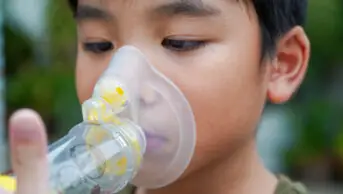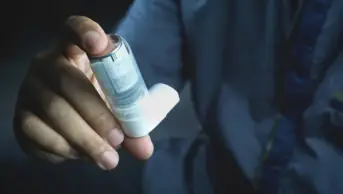
Shutterstock.com
Around a third of inhalers with no dose counters are disposed of for recycling despite having at least half the doses left, a study has found.
The paper, published in BMJ Open Respiratory Research on 25 December 2024, involved weighing used pressurised metered-dose inhalers that had been returned for recycling — as part of the Take AIR (Action for Inhaler Recycling) pilot scheme, sponsored by manufacturer Chiesi, which ran in community pharmacies and hospitals in Leicester, Leicestershire and Rutland between 2021 and 2023.
The researchers weighed more than 2,500 of the returned inhalers to establish the level of dosage remaining in them, and they found that those with dose counters were much more likely to be returned empty (521 out 1,015 inhalers or 51.3%) compared with those without counters (372 out of 1,480 inhalers or 25.1%).
In addition, the proportion of inhalers with dose counters that were returned with more than half of doses still unused was much smaller (53 inhalers or 5.2%) than for inhalers without dose counters (492 inhalers or 33.2%).
The researchers also surveyed inhaler users and found that 149 out of 199 respondents (74.9%) reported using a dose counter to understand when their inhaler was empty. However, one-fifth of respondents (35 or 20.6%) said they continued to use their inhaler even though the dose counter displayed zero.
Most respondents using devices without a dose counter (16 out of 29 respondents or 55.2%) reported that they were not confident in identifying when their inhaler was empty.
Of all inhaler users, 49 (24.6%) said they stopped using it when a dose of the medicine was no longer received; 45 (22.6%) said they stopped when the inhaler felt empty upon shaking it and 38 (19.1%) said they used it no longer when the inhaler stopped ‘puffing’.
Anna Murphy, consultant respiratory pharmacist at University Hospitals of Leicester NHS Trust and study co-author, said: “This research shines a light on a concerning reality that patients lack the knowledge to know when to replace their inhaler device.
“Patients may, therefore, be at risk of serious exacerbations and, potentially, hospitalisation due to overuse of their inhalers. Tackling this challenge collectively, ensuring patients are educated, is crucial for improving outcomes.”
Commenting on the study, Andy Whittamore, clinical lead at charity Asthma + Lung UK, said: “Many people do not know when their inhaler is empty. This puts people at risk of harm if [they] are continuing to use [their] inhaler once it’s finished and [they] are not getting the medication they need.
“An empty preventer means [they] may develop a build-up of inflammation and develop symptoms or exacerbations. An empty reliever means [they] cannot treat life-threatening breathlessness. Some inhalers do have dose counters, with some being more accurate than others.”
The Take Air inhaler recycling scheme led to more than 50,000 inhalers being returned for recycling, but Chiesi announced in June 2023 that the scheme was to end.
In August 2021, NHS England said that it had no plans to introduce a national inhaler recycling scheme, despite aims to reduce the NHS’s carbon footprint to net zero by 2040, with an 80% reduction by 2028–2032.
Approximately 73 million inhalers are prescribed in the UK annually, which currently constitutes around 3% of total NHS UK carbon emissions.


